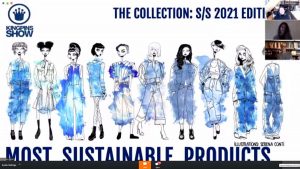
MÖNCHENGLADBACH, Germany — April 29, 2020 — Monforts denim customers rallied to support a virtual version of the Kingpins denim show that was scheduled to take place in Amsterdam on April 22-23.
When the organizers were obliged to cancel the physical event due to COVID-19 restrictions, they immediately began working on an online alternative, and such was the positive response that they were able to livestream seamlessly across the entire two days that the show had been scheduled to take place.
Interviews, discussions, catwalk displays and presentations featuring brands, denim mills, artisans and raw materials suppliers were broadcast successfully from five continents.
In opening Kingpins24 on April 22 at 9 a.m., show Founder Andrew Olah (at 2 a.m. from Texas) and his co-host, Managing Director Vivian Wang (at midnight in Los Angeles), explained that more than 75 percent of the exhibitors who were scheduled to be in Amsterdam had responded positively to the idea, providing content and arranging interview slots and new presentations.
True Blue Solutions
Many of the companies involved outlined their development of new in-house practices and processes for more sustainable denim fabric production through the reduced use of water, chemicals and energy and it was no accident that Monforts customers dominated the Kingpins 2021 Most Sustainable Products (MSP) design collection.
While the organisers stressed the MSP was not a competition, merely a showcase of the latest sustainable denims, it featured fabrics from Aristic Milliners, Bossa, Calik, Kilim, Naveena, Orta Anadolu, Prosperity Textile and Vicunha.
Many companies are now using their existing Monforts technologies within integrated finishing mills to develop new in-house processes and further improve their ecological performance.
Artistic Milliners, for example, working with chemicals leader DyStar, has introduced Crystal Clear, an indigo dyeing process which is based on an organic fixing agent. It requires no salt and 70-percent less chemicals and produces clean and recyclable water effluent without any salt by-products. In conventional systems, the company says that indigo dyestuff is stored after the dyeing process and only about 20 percent can be reused due to salt formation. Crystal Clear uses a prereduced liquid indigo that requires no additional water or salt and allows complete indigo recovery.
Hong-Kong-based Advance Denim has developed a similar process it calls Green Finishing for removing indigo and the 100-percent recycling of water.
With the D-clear process developed by Calik of Turkey, water is reduced by 40 percent in indigo dyeing and by 83 percent in the subsequent finishing, while another Turkish company, Kilim, is looking to reduce water by 93 percent as a result of its current Cactus project.
Circularity
Monforts denim customers are also constantly exploring the possibilities of new and more sustainable raw materials and the latest to be featured prominently is hemp, as exemplified by Cone Denim’s new Sweet Leaf collection.
Cone Denim has also been working extensively on the Jeans Redesign project drawn up by the Ellen MacArthur Foundation (EMF) with the aim of making circular production a reality. The project has involved a number of leading brands including Adidas, Burberry, C&A, Gap, H&M, M&S, Primark and Unilever.
Via this project, Cone has already produced a 100-percent cellulosic denim collection for Gap, although as a result of the coronavirus, its launch date has had to be pushed back to Spring 2021.
“The collaborative spirit from our brand partners is very encouraging, and we are excited by the energy and commitment within the denim community and believe there are many more opportunities to drive sustainable collaborations ahead,” said Cone president Steve Maggard.
Current outlook
Pursuing similar circularity goals is Soorty, which has already achieved Cradle to Cradle (C2C) Gold certification for both denim fabrics and garments produced to the most exacting standards.
In an interview on the current situation during Kingpins24, company director Asad Soorty said that with manufacturing plants in Bangladesh and Pakistan, a product development centre in Çorlu, Turkey, and a design house in Amsterdam, the immediate future for his company looked very uncertain, yet he remained optimistic.
“We have seen many cancellations and postponements of orders, but as a fully vertically integrated manufacturer we are not in a position to stop payments because we purchased cotton and other raw materials for many months ahead,” he said. “As a result, we have a lot of stuck capital and anticipate that when we are able to resume production, we will only be at 10 to 20 percent of capacity.
“However, I believe this industry can unite and understand the problems of everyone in the supply chain. In the next 18 months we will see very price-conscious consumers who are more cognisant of the environment, because we’ve seen the world tipped on its head. As a result, I believe our initiatives such as Cradle to Cradle and full transparency, combined with good prices and short lead times will prove even more valuable to the brands.”
Optimism
Kingpins24 was a meticulously scheduled international program, planned in just 30 days, with no real template. However improvised and rushed it may have been in the build-up to it, the show ran over Zoom for the full two days with virtually zero technical issues and attracting thousands of online attendees to dip in and out of it from around the world.
The mood of the entire two-day virtual event was upbeat and optimistic, as best summarised by Menno van Meurs, founder and CEO of highly successful Amsterdam denim store Tenue de Nîmes:
“Sometimes difficult roads bring you to beautiful places and we’re seeing so much creative energy and new ideas being exchanged right now,” he said. “I believe that, despite the tragedy, what is happening will bring us to a place that’s better than the one we left behind.”
Posted April 29, 2020
Source: A. Monforts Textilmaschinen GmbH & Co. KG




